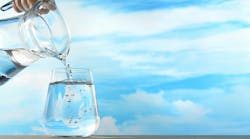I was talking with someone recently about the challenges of reusing wastewater as drinking water. While it is relatively straightforward to treat wastewater to drinking water standards with today's technology, public acceptance is a different story.
Water is the ultimate recyclable product: the water we drink today almost certainly passed through the gut of a dinosaur a million years ago and has been reused countless times since. But float the concept of "toilet to tap" and you will draw an ugly crowd.
The National Research Council just released a new report examining the benefits of water reuse. In particular, reusing water for irrigation, industry, and other applications could significantly increase the nation's total available water resources, particularly in coastal areas facing water shortages, the report's authors said.
The report also suggests that the possible health risks of exposure to chemical contaminants and disease-causing microbes from wastewater reuse do not exceed, and in some cases may be significantly lower than, the risks of existing water supplies.
"Wastewater reuse is poised to become a legitimate part of the nation's water supply portfolio given recent improvements to treatment processes," said R. Rhodes Trussell, chair of the committee that wrote the report and president of Trussell Technologies.
The report examines a wide range of reuse applications, including potable water, non-potable urban and industrial uses, irrigation, groundwater recharge, and ecological enhancement. The committee found that many reuse projects, such as irrigating golf courses and parks or providing industrial cooling water, are well-established and generally accepted.
It outlines wastewater treatment technologies for mitigating chemical and microbial contaminants, including both engineered and natural treatment systems. These processes can be used to tailor wastewater reclamation plants to meet the quality requirements of intended reuse applications. The committee emphasized the need for process reliability and careful monitoring to ensure that all reclaimed water meets the appropriate quality objectives for its use.
Costs of water reuse for potable and non-potable applications vary widely based on site-specific factors, the committee said. Water reuse projects tend to be more expensive than most water conservation options and less expensive than seawater desalination and other new supply alternatives.
Although the costs of reclaimed water are often higher than current water sources, the report urges water authorities to consider other costs and benefits when assessing reuse projects. For example, water reuse systems used in conjunction with a water conservation program could be effective in reducing seasonal peak demands on the drinking water system.
Water reuse regulations differ by state. Adjustments to the federal regulatory framework could help ensure a high level of public health protection, provide a consistent minimum level of protection across the nation, and increase public confidence in potable and non-potable water reuse.
The report notes that existing legislative tools could be applied to improve the quality of water for reuse, including updating the National Pretreatment Program's list of priority pollutants to include a wider inventory of known toxic substances. Also, it lists 14 areas of research to help guide the country on how to apply water reuse appropriately. Such research would require improved coordination among federal and nongovernmental organizations.
For additional details on the report and the sponsoring organizations, visit http://national-academies.org
James Laughlin, Editor
More WaterWorld Current Issue Articles
More WaterWorld Archives Issue Articles


